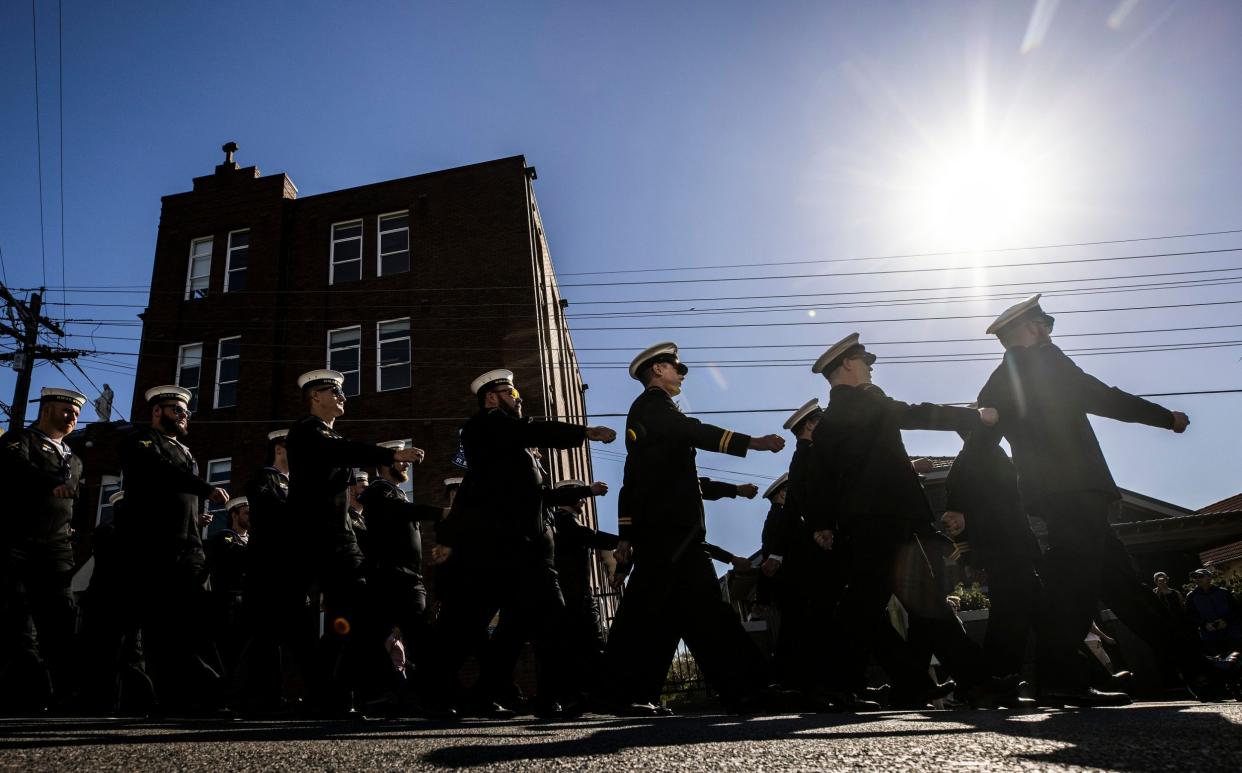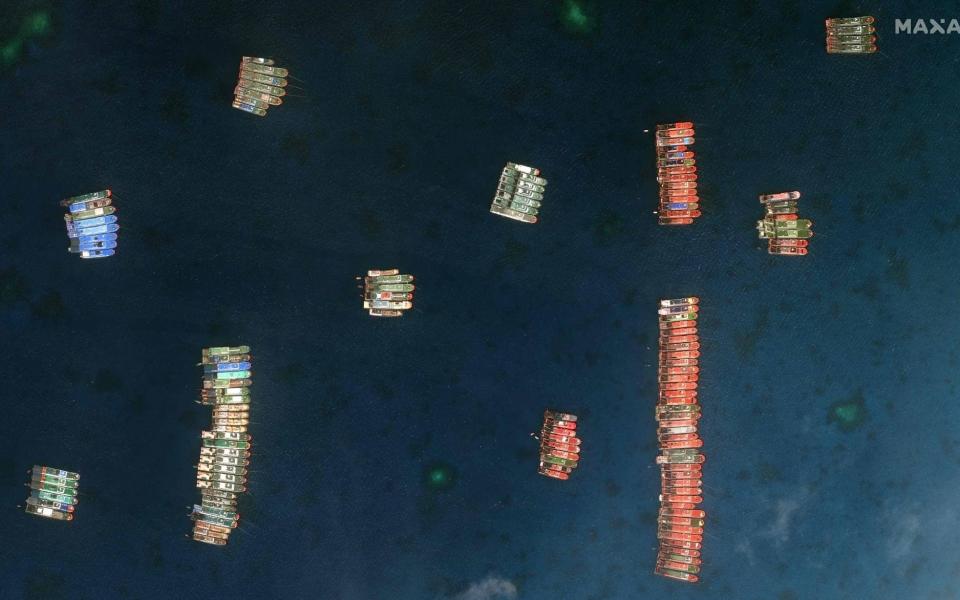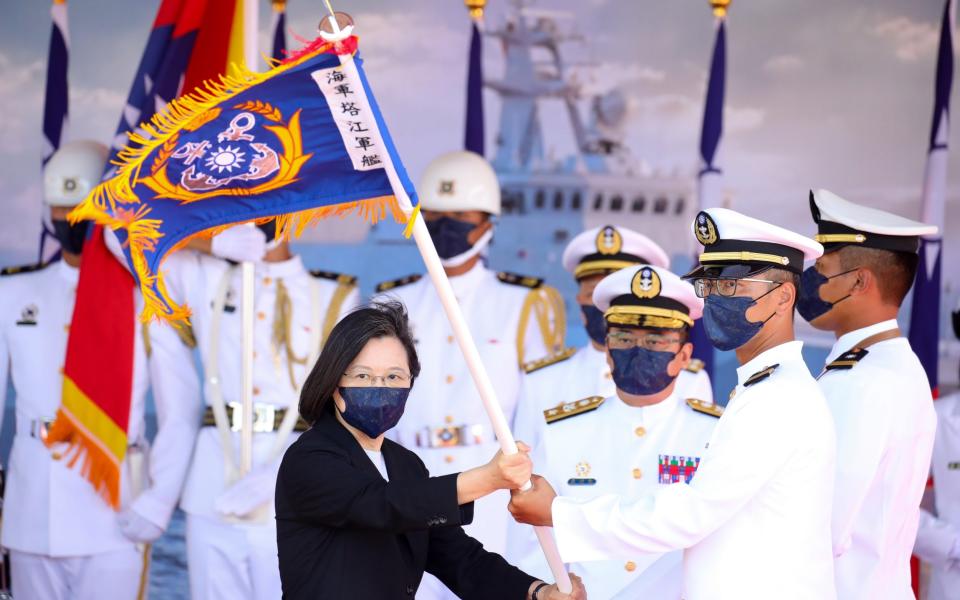China tells West to 'shake off Cold War mentality' after UK, US and Australia launch major new security pact

China on Thursday accused the UK, the US and Australia of fuelling an “arms race” in the Pacific that will make the region more dangerous after the three announced a broad security alliance.
The new deal, dubbed Aukus and unveiled on Wednesday, will see London and Washington help Canberra to build nuclear-powered submarines as well as swap knowledge on cyber information, artificial intelligence, undersea technology and other cutting-edge sciences.
Zhao Lijian, a spokesman for the Chinese foreign ministry said the three countries were "severely damaging regional peace and stability, intensifying an arms race, and damaging international nuclear non-proliferation efforts”
The foreign ministry earlier warned that the alliance would only "shoot itself in the foot" and that it represented an "outdated Cold War mentality".

Boris Johnson, the prime minister, denied the arrangement was specifically aimed at China, telling the House of Commons: “I think it is important for the house to understand that Aukus is not intended to be adversarial towards any other power.”
In another attempt to defuse Beijing’s fury, Australian prime minister Scott Morrison said he remained ready to hold discussions with Xi Jinping, his Chinese counterpart, despite high-level talks being frozen amid deteriorating relations between the two countries.
The new arrangement, which comes just weeks after US president Joe Biden oversaw a chaotic withdrawal of US forces from Afghanistan, is widely seen as part of a broader refocusing of American military and diplomatic might on countering China.
Mr Biden is due next Friday to host a meeting of the leaders of Australia, India, and Japan, an informal alliance of pro-US allies in the Indo pacific known as the “quad”.
The Aukus partnership will first seek to help Canberra build eight nuclear-powered submarines.
Australia will be the second country after Britain in 1958 to be given access to US nuclear technology to build such military craft.
Nuclear-powered submarines are able to submerge for much longer than their diesel-electric counterparts and will allow the Royal Australian Navy to patrol undetected in disputed South China Sea waters that China currently claims as its own.
The decision saw Canberra ditch a $90 billion contract to buy diesel-electric submarines from France, which condemned the move as “a stab in the back”.
“This brutal, unilateral and unpredictable decision reminds me a lot of what Mr Trump used to do...I am angry and bitter,” said foreign minister Jean-Yves Le Drian.
Ben Wallace, the defence secretary, on Thursday denied the arrangement was a betrayal of France, describing the decision purely as a rational response to China’s own military expansion.
“The Australians took a view they wanted a strategic step change in their capability,” he said.
“Fundamentally we all see that China has invested more than anyone else on the planet in increasing its armed forces.
“Australia is joining that very small club of nations that have nuclear powered submarines, and it gives them a strategic advantage.”
China has rapidly expanded its navy in recent years, adding its first ever combat ready aircraft carriers and nuclear-powered submarines to a vast fleet of frigates and other light ships designed to project power into the Pacific.
Beijing has also established a patchwork of military outposts in the region, turning rocks and reefs into artificial islands with airstrips, hangars, ports and surface-to-air missile systems.
It has also significantly escalated its manoeuvres in the contested parts of the South China Sea, buzzing warships over the ocean and deploying maritime militia – moves that have alarmed neighbours including Vietnam, the Philippines and Japan.
Mr Wallace said that China’s navy lagged behind the West in terms of combat preparedness. “It doesn’t matter how many secrets you steal, it doesn’t replace 60 years of experience,” he said.
The submarine deal has been viewed as part of the US strategy to protect the so-called "first island chain" which includes Japan and Taiwan, the latter of which Beijing claims as its own and has threatened to invade.
Taiwan’s strategic importance at the critical midpoint of the first island chain, a thread of major archipelagos that runs from Russia’s Kuril Islands to the Malay Peninsula, lies at the heart of Washington’s Indo-Pacific policy.

On Thursday Taipei proposed extra defense spending of $8.69 billion over the next five years, including on new missiles, as it warned of an urgent need to upgrade weapons in the face of a "severe threat" from giant neighbor China.
Vice-President Lai Ching-Te said the Aukus deal represented a “positive” development for peace in the region.
Japan has also become increasingly alarmed at Beijing’s military posturing near its shores, particularly over the flashpoint of the Senkaku Islands, over which it has competing claims with China.
In an interview with CNN on Thursday, Japanese Defense Minister Nobuo Kishi said Japan would defend the Senkakus as its own territory, with Tokyo matching any Chinese threat to the islands ship for ship, and beyond if necessary.
He added that "stabilizing the situation surrounding Taiwan is important for Japan's security,” noting that “ninety percent of energy that Japan uses is imported through the areas around Taiwan.”

 Yahoo News
Yahoo News 
